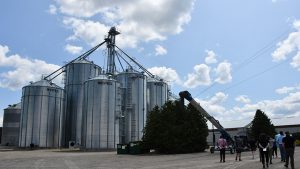COVID-19 financial update
CONVERSATIONS WITH BUSINESS EXPERTS
Updates to support programs:
- The 75% Canada Emergency Wages Subsidy (CEWS) – The program was originally intended to be in place for a 12-week period, from March 15 to June 6, 2020, but has since been extended to August 29, 2020.
- The 10% Small Business Wage Subsidy (SBWS) – Employers now have the option of forgoing the SBWS in favour of a higher CEWS claim, since any claim under the CEWS is reduced by amounts claimed under the SBWS.
- The Canada Emergency Business Account (CEBA) – Organizations that have less than $20,000 in payroll costs in 2019 can still qualify if they have a CRA Business Number (BN), filed a 2018 or 2019 tax return, and have eligible non-deferral expenses of between $40,000 and $1,500,000 (e.g. rent, property taxes, utilities, and insurance).
Updates on changes to taxes, GST and HST filing and payment deadlines:
- CRA recently announced that they will not assess penalties, including late filing penalties, if an individual filed their tax return and pays any balance owing by September 1, 2020.
- The filing deadline for a corporation that would have had a return due June, July, or August 2020 has been extended to September 1, 2020.
(J.M.) WHAT IMPORTANT FINANCIAL OR ACCOUNTING UPDATES DO GRAIN FARMERS NEED TO KNOW ABOUT?

(J.M.) Since the development of COVID-19, provincial and federal governments have implemented any number of economic stability measures and programs. Many of these support measures for businesses are relevant for Ontario grain farmers. Here are a few to note.
- The 75% Canada Emergency Wages Subsidy (CEWS) — A subsidy of 75% of the first $58,700 of eligible remuneration normally paid to employees, up to a maximum of $847 per week, per employee. The program will be in place for a 12-week period, from March 15 to June 6, 2020. Keeping in mind the per-employee limits, there will be no overall limit on the subsidy amount that an eligible employer may claim. Access to the subsidy is based on employers suffering a drop in gross revenues of at least 15% in March 2020, 30% in April 2020, and/or 30% in May 2020, when compared to the prior year, or in some cases the average gross revenue for January and February 2020. Gross revenues can be calculated using the cash method of accounting, which is the accounting method normally used by most farm businesses. Eligible employers will be able to access the subsidy by applying through Canada Revenue Agency’s (CRA) My Business Account portal, as well as a web-based application.
- The 10% Small Business Wage Subsidy (SBWS) — A subsidy equal to 10% of remuneration paid during the eligible period (March 18, 2020 – June 19, 2020), up to a maximum subsidy of $1,375 per employee and $25,000 per employer. Employers claim this subsidy by reducing the remittance of income tax withheld on behalf of employee wages.
- The Canada Emergency Business Account (CEBA) — An interest-free loan of up to $40,000 to small businesses to help cover operating costs. To qualify, organizations will need to demonstrate they paid between $20,000 and $1,500,000 in total payroll in 2019. Repaying the balance of the loan on or before December 31, 2022 will result in loan forgiveness of 25% (up to $10,000). Applications should be made online at a financial institution, and many farmers have likely already received notice from their current financial institution regarding this program.
Many of the relief programs will require maintaining good books and records to be able to demonstrate a farm business qualifies for the relevant subsidy. Unfortunately, legislation in support of some of the relief measures (i.e. CEWS) is complicated and many businesses will likely require the assistance of a professional accountant to determine whether they are eligible for them or not. Speak to your accountant if you have any questions or concerns about the programs or to determine if your farm qualifies for support.
WHAT CHANGES HAVE BEEN MADE TO TAXES, GST AND HST FILING AND PAYMENT DEADLINES?
It’s important to note changes that have been made to the 2020 tax and GST/HST filing dates. In addition, many provinces have announced extensions for various provincial taxes, including a deferral of WSIB premiums in Ontario.
Individuals — Individual tax filing deadlines for 2019 have been extended from April 30, 2020 to June 1, 2020. Individuals earning self-employment income (i.e. farming income earned as a sole proprietor or partner), and their spouses, have always had an extended filing deadline — June 15 — no change has been made to that deadline so they still need to file by June 15, 2020.
Regardless of the filing deadlines, the payment of any tax balance owing for 2019 that would have been due on April 30 has been extended until September 1, 2020.
Corporations — If the corporate tax return (T2) was due on or after March 18, the filing deadline is extended to the later of June 1, 2020 and the original due date. A corporation with a December 31, 2019 year-end, for example, would still have to file the T2 by June 30, 2020 (six months following year-end).
For Canadian-Controlled Private Corporations (CCPCs) that are eligible to pay the balance of corporate tax three months after year-end, any payment of Part I tax normally due after March 17, 2020 is extended to September 1, 2020. I expect this extension would apply to most Canadian farming corporations.
Part I tax would be the income tax owing on regular business income. It is important to note that there have not been any extensions of income tax under other parts of the act — i.e. Part IV tax (tax on dividends received by private companies), employer payroll withholdings, or Part XIII tax (withholding tax on amounts paid to non-residents of Canada).
For corporations that are not eligible to pay the balance of corporate tax three months after year-end, there is only an extension on Part I tax if it became due on or after March 18 (whether it is a balance due or an instalment payment).
GST/HST — Remittance deadlines have been extended to June 30, 2020, to the extent they would be due after March 18, and before June 30, 2020. GST/HST return filings have not been extended, however the CRA has indicated they won’t impose penalties where a return is filed late, provided that it is filed by June 30, 2020.
The federal and provincial governments are adjusting programs as the impact of COVID-19 develops. Farm businesses are advised to keep informed on financial programs and updates and check in frequently with their accounting advisors. For more information and updates on income taxes and programs, visit www.bdo.ca/. •




















